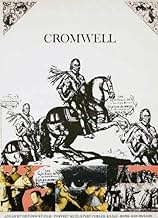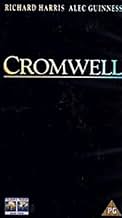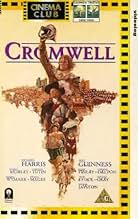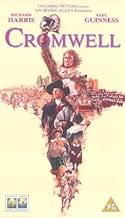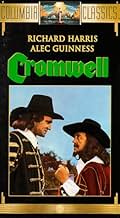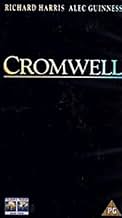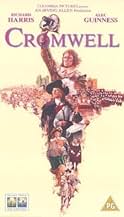Oliver Cromwell ya no puede tolerar las políticas del Rey Carlos y la egoísta clase gobernante y lidera una guerra civil para instaurar al Parlamento como poder supremo en Inglaterra.Oliver Cromwell ya no puede tolerar las políticas del Rey Carlos y la egoísta clase gobernante y lidera una guerra civil para instaurar al Parlamento como poder supremo en Inglaterra.Oliver Cromwell ya no puede tolerar las políticas del Rey Carlos y la egoísta clase gobernante y lidera una guerra civil para instaurar al Parlamento como poder supremo en Inglaterra.
- Dirección
- Guionista
- Elenco
- Ganó 1 premio Óscar
- 2 premios ganados y 5 nominaciones en total
- Dirección
- Guionista
- Todo el elenco y el equipo
- Producción, taquilla y más en IMDbPro
Opiniones destacadas
"Cromwell" is one of the few exceptions. As the title suggests, it is based on the life of Oliver Cromwell and concentrates on the 1640s, the decade during which Cromwell rose from a modest Huntingdonshire country squire to commander of the Parliamentary forces during the English Civil War and played a leading role in the deposition and execution of King Charles I. It has less to say about Cromwell's rule as Lord Protector of Great Britain and Ireland in the 1650s.
The film has been criticised for its historical inaccuracies. This sort of thing can normally be put down to a lack of adequate research, and the film does indeed contain a few mistakes of this type. (Cromwell's son Oliver junior was not killed at the Battle of Naseby but died of natural causes, and the Earl of Essex and the Earl of Manchester are shown as sitting in the House of Commons rather than the House of Lords). In most cases, however, inaccuracies which might appear to be careless errors are really deliberate distortions made to fit in with the film's underlying agenda which is to whitewash Cromwell's character and to present him as a hero of democracy.
In the period leading up to the Civil War, Cromwell's prominence in the opposition to Charles I is exaggerated. In a meeting which never took place, he is shown as telling the King that England should be a democracy and he is incorrectly numbered among the five members of Parliament whom Charles attempts to arrest.
During the war itself the film depicts Cromwell as single-handedly transforming the Parliamentary Army, after a disastrous defeat at the Battle of Edgehill, from a disorganised rabble into an effective fighting force and as a military genius whose tactics are responsible for the defeat of a numerically superior Royalist force at the Battle of Naseby. In fact, Edgehill was an indecisive battle rather than an outright Royalist victory- if Charles had won as decisively as he is shown doing here the war would probably have been over very quickly- and at Naseby it was the defeated Royalists, not the victorious Roundheads, who were outnumbered. The film omits the Battle of Marston Moor, arguably a more decisive turning-point than Naseby, possibly because Cromwell was not in overall command of the Parliamentary armies on that occasions. (The commanders in that battle were Sir Thomas Fairfax and Manchester, neither of whom are shown in a good light in the film). To emphasise Cromwell's piety, the famous prayer of the Royalist Sir Jacob Astley at Edgehill is put into his mouth.
The main reason why the film does not concentrate too much on Cromwell's record after 1649 is that that record will not bear too much scrutiny if one regards him as a hero. Although one view of history has traditionally seen the Roundheads as fighting for parliamentary democracy, Cromwell made himself dictator of Britain by force of arms, succeeded where Charles had failed in ruling without Parliament and had himself proclaimed Lord Protector, monarch in all but name. Had his son Richard, who briefly and ineffectually succeeded him, been a man of the same ruthless stamp, Britain might today be a Hereditary Protectorate under the House of Cromwell. The greatest stain on Cromwell's memory, the brutal subjugation of Ireland which cost several hundreds of thousands of lives, is totally ignored. (The film gives the impression that he spent the years in question, 1649-53, living peacefully on his farm in Huntingdon).
As a costume drama the film is not a bad one and succeeds in bringing seventeenth-century England to life. Richard Harris is not particularly good in the title role, especially as he is not always successful in concealing his Irish accent. (Given Cromwell's antipathy to, and persecution of, the Irish, it seemed ironic to have him played by an Irishman). There is, however, an excellent performance from Alec Guinness as Charles I, who is treated more objectively than are his political opponents. There is no attempt to blacken Charles' character, although there are a couple of inaccuracies. Charles did not treat his nephew Prince Rupert as shabbily as he is shown doing here, and his trusted adviser Sir Edward Hyde did not testify against him at his trial. (Had Hyde done so, he would doubtless have been executed at the Restoration instead of becoming Charles II's chief minister). Guinness plays Charles as a man who, beneath his outward dignity and firm belief in the Divine Right of Kings, is nervous, hesitant and self-doubting, something indicated by a stammer. One senses from Guinness' portrayal that although Charles was a bad king he may not have been a bad man.
Some have seen a film which praises a republican rebel as revolutionary, but in fact hagiography of Cromwell is far from something new. The film's politics fall broadly within the Whig tradition, which saw English history in terms of a steady progression towards the triumph of liberty and Protestantism- two concepts which for the Whigs were practically indistinguishable- and the Civil War as a vital step in this process. The film also shows the influence of Thomas Carlyle, who regarded Cromwell as one of the heroes of history and eulogised him in his "Heroes and Hero-Worship". By 1970, however, this approach to history was starting to look outdated and Carlyle's idea of hero-worship hopelessly naive. If the charismatic dictators of the twentieth century have taught us anything, it is to beware of the strong man on the white horse. 7/10
I also feel that for a film to be educational and informative it has to be accurate and unfortunately Cromwell is never going to win any awards in the 'what really happened' category.
Despite these inaccuracies, the film does give us a general idea of what went on in the England of the 1640's so it still has the power to be enjoyable.
Alec Guinness steals the entire film with the only accurate portrayal in the movie as Charles I. The stuttering Scot who believes in the divine right of Kings. A man who looks upon Parliament as a challenge to his authority over the people, and a head of a protestant state wrestling with his own strong catholic leanings and sympathies.
Richard Harris is outstanding and brilliant, but portrays Cromwell as someone he most certainly wasn't. As an Irishman, it amazes me what ever persuaded him to take on the role. With Cromwell being the most hated Englishman in Irish history, I was surprised he didn't portray him as an evil oppressor and murderer complete with handlebar moustache, top-hat and cape accompanied by Hammond organs and loud hissing sounds from the audience.
Instead Harris' Cromwell is so nice and decent, honourable and just that by movies end he would have been welcomed at any dining table in County Cork.
Cromwell's belief was that Parliament runs the country and the people run the Parliament (reminder for Tony Blair!!!) The system we have today. However during his time as head of a republic state, he seemed to have forgot this and went his own way on nearly everything despite what the people wanted (remind you of anyone Tony Blair!!!)
So again inaccuracies rain on what is on the whole a very good parade.
The battle scenes also fail to excite as they are not filmed on the dramatic scale needed to have done them justice. In fact sometimes they are reminisent of Monty Python's reenactment of the Battle of Pearl Harbour by the Batley Towns-women's Guild.
Watch this film and enjoy it as I did, but I beg of you, don't use it as a basis for a factual thesis in your History Degree...you will fail big time.
However, the film has equally strong bad points. It tends to drag at many points and frequently gives the impression of being an overly drawn-out stage production that fails to be fully convincing. More serious, though, is the problem that, although presenting itself as historical, it plays fast and loose with history. It does not fully explain the causes of the Civil War or the differences of viewpoints within each side, especially the Parliamentarians, not all of whom were fighting for the same reasons. It portrays the Royalist forces as the flashy, well-equipped and stronger element when in reality the Parliament forces were not only much more numerous, but usually much better equipped as well (after all, it was not a war of rag-tag, grass-roots rebels trying to topple the government; each side represented in part one branch of the government and Parliament, not the king, was the body that held the purse strings). In addition, the Royalists often did quite well in battle despite their inferior forces. It clearly makes Cromwell out to be too important from the start: rather than being one of the key leaders in the beginning, he really started out as a military commander and simply rose to prominence over time. Finally, Cromwell, despite some of his autocratic tendency coming through, is still shown to be too much the reluctant, noble hero, and the film only hints at his other face, one which in short order made him none too popular in England, let alone Ireland. Needless to say, nothing is mentioned of his willingness to shed the blood of Royalists and Catholics, or to destroy historic architecture that conflicted with his Puritan views.
The Civil War was not a conflict over religion, although it played it's part. It was about "the divine right of kings", against the governance of, by and for the people, i.e. Rex v Parliament. Divided loyalties and opinions were split right across the board.
The capital charges of treason brought against the king was, to my mind, not altogether trumped up, and had some validity. However it was of course a "show trial", and to bring it about the laws had to be changed rapidly. There was no edict at the time that allowed anyone to put a monarch on trial. Issac Dorislaus (a Dutch lawyer) came to the rescue of Parliament. He wrote an order that would enable it to set up the court. This order was based on an old Roman law which stated that a military body (in this case the Parliamentary forces) could legally overthrow a tyrant. Naturally Charles I did not agree, either to this law, or that he was a tyrant. He was still the King, still the Head of State, and as such, above the law. He could do as he wished, and was answerable only to God. For him it was an unfortunate way of looking at things.
The casting of this movie was extremely well thought out, but with one exception. Cromwell himself. I'm not criticising Richard Harris in any way. He played the role superbly, but I'm sure he didn't have an Irish accent. Also he had some extremely noticeable warts on his face which Richard Harris did not. Had the make-up artists gone on vacation? To his credit Richard overcame this miscasting, and acquitted the characterisation of the brusque, complex, and religiously enigmatic Oliver Cromwell with great fervour and passion, and I doubt if anyone else could have done it any better.
On the subject of accents, I wonder whether or not the Scottish accent adopted by Alec Guinness was apt. As Charles I left Scotland at the age of 4, and lived in England until his death, surely he would have cultivated an English one? True he had a Scottish tutor, but I'm still left to wonder. Perhaps someone could set me right.
(Just as a byline, I find it curious that Richard Harris, being an Irishman, accepted the part. In the greater part of Ireland the very name of Oliver Cromwell is loathed and reviled, and for good reason, so it says much for Harris's devotion to the acting profession that he actually did.) Being a musician, I was highly amused at seeing (and hearing) bugles played on horseback during a 17th century battle, reminiscent of the US 7th cavalry. Such instruments weren't developed to such an advanced stage until late into the following century (the 18th).
As another reviewer has noted, Cromwell was certainly not one of the "Five Members" who were to be removed from the House and arrested. These were: John Pym, John Hampden, Denzil Holles, Sir Arthur Haselrig and William Strode. A sixth man, Lord Mandeville (the future Earl of Manchester) was also to be taken.
There are quite a few more historical mistakes and omissions on which other reviewers have remarked, and I don't intend to repeat them. But in defence of the producers it must be said that "The English Civil War" was a momentous stage in British, perhaps even world history, and to illustrate it all in a couple of hours is impossible. Much as Shakespeare, when writing "Henry V", managed on a small stage to capture the flavour of Agincourt and events leading up to it, so this production coped well with a similar task on film. Therefore if certain liberties were taken, and artistic licence used, I think they can, in this case, be excused. Should it have encouraged one student to scuttle towards the history books (or now websites), to learn more about the whole period, then I would say it was a job well done.
Secondly, yes there is some idea conveyed of the turmoil of the period; the Levellers get a slight, if ridiculously truncated, mention.
However, anyone who knows the slightest snippet about the period must have left the TV screen or whatever nothing but annoyed by the gross licence taken with the events of the civil war. And it is not just the fact that I have studied the period in depth that makes such glaring inaccuracies as:>
Cromwell being named as one of the Five Members, he wasn't.
Cromwell even being present at Edgehill, let alone rescuing the day. Neither are true. At the same time the "arrangement" between the officers of the opposing side which was so crucial to the film never happened; and, at the end of the day the Royalists did not actually win the battle. It was a draw. Okay, I can live with some details being slightly wrong, but the outcome of the entire engagement...?
Why miss out the most bloody, viscious and, many would say, crucial battle of the war? At least at Marston Moor Cromwell was actually there.
Naseby, too, was grossly misrepresented: a) Cromwell did not command the parliamentary forces, Fairfax did; and b) in reality the Royalist force was just over half the size of that of parliament: hardly the stunning victory of a smaller force led by Cromwell as portrayed in the film.
The Civil War was in no way Catholic versus Protestant: both sides were Protestant and, to be technical, both were mostly heartily opposed to Charles' Laudianism (a kind of mixture of the two). However in 1970 some scholarship did maintain this so this mistake can perhaps be understood.
These are just some of the many nitpicking points that seem to preclude the idea that "Cromwell" provides "an excellent history lesson". However, "Appocalypse Now" and "The Thin Red Line" are both examples of historically inaccurate but still highly effective and powerful films. How come "Cromwell" fails on this count? Well, on the one hand neither of these, more recent, films even claim to portray real people -"Cromwell" does and therefore its stubborn disregard of the truth cannot be ignored. Then, on the other hand, if the film attempts to be more than just a reasonably nice looking swashbuckler (which it does) and to really look into the character of its protagonists then surely its case is harmed by these shocking errors. For example, how can the film attempt to portray Cromwell as a man made by his times (rather than the other way around) when it suggests that he was a significant player from the start. Before the outbreak of Civil War Cromwell had made just one vaguely significant speech in parliament. He was never contacted by Pym before the call of Parliament and there was no question of him ever leading the armies of Parliament until the retirement of Fairfax on the eve of the (curiously unmentioned) Second Civil War. Indeed he did not become official leader of the country until 1653. His rise to power was a great surprise to him and his countrymen.
Finally, why miss out Ireland completely from the equation when surely there is no more interesting aspect to the man's character than his opinions on religion?
Cromwell deserves a more accurate cinematic perspective, and surely half of the problem is that this film attempts to cram the ten most monumental years of British history into three hours.
Definately a "could do better".
¿Sabías que…?
- TriviaWhen writer / director Ken Hughes said to Richard Harris that no self-respecting Irishman should ever play Oliver Cromwell, Harris laughed.
- ErroresCromwell was not one of the Members of Parliament named for arrest in the King's warrant. Cromwell was not present in Parliament at the time the King and his troops entered the House of Commons. The scene of he alluding that The King is a traitor actually happened with John Elliott some ten years prior.
- Citas
King Charles: I do swear that hold this England and its laws dearer to my heart than any here. But gentlemen, if you would reduce me to a figurehead - a puppet king, manipulated by parliament - how then would I serve my country? What manner of king would I be?
Oliver Cromwell: I am persuaded, Your Majesty, that England must move forward to a more enlightened form of government, based upon a true representation of a free people. Such an institution is known as... "democracy", sir.
King Charles: Democracy, Mister...
Oliver Cromwell: Cromwell, sir.
King Charles: Democracy, Mister Cromwell, was a Greek drollery based on the foolish notion that there are extraordinary possibilities in very ordinary people.
Oliver Cromwell: It is the ordinary people, my lord, who would most readily lay down their lives in defense of your realm. It is simply that "being ordinary", they would prefer to be asked - and not told.
- ConexionesFeatured in 52nd Annual Academy Awards (1980)
Selecciones populares
Detalles
- Fecha de lanzamiento
- Países de origen
- Idioma
- También se conoce como
- Cromwell
- Locaciones de filmación
- Productoras
- Ver más créditos de la compañía en IMDbPro
Taquilla
- Presupuesto
- GBP 3,750,000 (estimado)
- Tiempo de ejecución
- 2h 19min(139 min)



